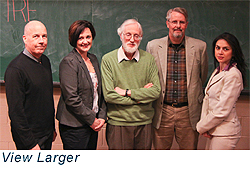April
07 2012
Problems continue for
Baha’i educators in Iran
By Jakob Kuzyk
 It’s
1998 in Iran, and a blow has been dealt to the attempts of the
country’s largest religious minority to access education. It’s
1998 in Iran, and a blow has been dealt to the attempts of the
country’s largest religious minority to access education.
Followers of the Baha’i faith, who since the Iranian revolution of 1979
have been virtually banned from attending post-secondary institutions,
had begun what the New York Times called a “stealth university” in 1987
with nearly 1,000 students, 145 alumni, and a network of converted
basement classrooms and laboratories.
The network was dismantled that September when Iranian security
officials raided some 500 homes and several offices, arresting
lecturers and confiscating textbooks and laboratory equipment.
This blow was not the first, nor would it be the last to the Baha’i
Institute for Higher Education (BIHE). However, the institute never
entirely ceased their clandestine operations and that year their
efforts would be rewarded with a major international boost.
In 1998, Carleton became the first post-secondary institution in the
world to recognize the BIHE undergraduate degree. By allowing students
into its master’s program, Carleton set off a chain reaction that
continued the following year with admissions granted by the University
of Ottawa. Now, 65 post-secondary graduate
programs from around the world have recognized and admitted BIHE
undergraduates, according to their website. Carleton has accepted 36
BIHE undergrads to date.
The issue of Baha’i education returned to the Carleton community in
recent months when the university made a public statement in January in
support of Nooshin Khadem, a Carleton graduate imprisoned in the
country.
Arrested on May 22, 2011, Khadem appeared in court in September 2011,
under the premise that she was using fraudulent teaching credentials.
Members of the Carleton community gathered again March 30 in a
discussion and screening of Education Under Fire, a documentary about
the sustained and current denial of education to those of the Baha’i
faith in Iran, and the covert backdoor provided by the BIHE.
A discussion moderated by Sherri Yazdani, former co-ordinator of BIHE
students in Canada, and led by Roger Blockley, the former dean of
graduate studies and research, followed the screening.
It was Blockley who pioneered the pilot program that first accepted
BIHE undergraduates to Carleton. He praised the academic strength of
the students that came to him, describing them as “really good.”
“They were probably the strongest cadre of international students we
had taken into the school in my deanship,” he said.
One of those students, a Carleton alumnus who will, like many BIHE
graduates, return to Iran and wishes not to be named for safety
reasons, punctuated the discussion in tears with a recount of her time
as a BIHE student. There were no buildings, she said, and classes were
held at the houses of volunteers, who would often feed the dozens of students.
Now, having heard of recent raids, she said she’s upset but confident
in the willpower of the students.
“I could not believe the students in BIHE [are] being imprisoned for
studying,” she said, noting, however, that it took only 10 days for
classes to resume last time there were raids.
Education, said Diana Salguero, a Carleton student and member of the
Baha’i community, is very important to her faith. From memory, she
recited words spoken by the founder of Baha’i faith, Baha’u’llah:
“Regard man as a mine rich in gems of inestimable value. Education can,
alone, cause it to reveal its treasures, and enable mankind to benefit there from.”
For Blockley, it will be “accumulated pressure” that will eventually
end the denial of education in Iran. This pressure needs to come from
within, but can also be applied from outside.
One method of applying pressure, as advocated throughout the evening,
was to sign the Education Under Fire online petition for “freedom of
education in Iran.” Found at their website, the petition is a letter
sent to the Supreme Leader and six other Iranian government officials.
Currently, there have been over 19,000 letters sent.
|